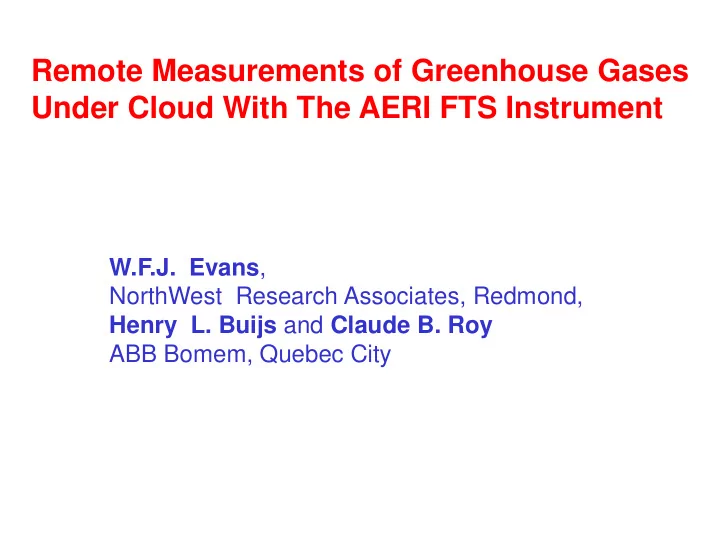

Remote Measurements of Greenhouse Gases Under Cloud With The AERI FTS Instrument W.F.J. Evans , NorthWest Research Associates, Redmond, Henry L. Buijs and Claude B. Roy ABB Bomem, Quebec City
The Measurement Concept . gases
The new AERI Automatic FTS for Atmospheric Monitoring Measures concentrations and climate forcing of gases
AERI Spectra under Clouds after Lubin (2006) H 2 O CFC11 HNO 3 O 3 CFC12
Thermal Emission Beneath Cloud Cover
Surface forcing of O 3 beneath Overcast Cloud
Measured O 3 Concentrations and Resulting Radiative Forcing
Comparison between Ozone Concentrations at the Surface and in the Lower Troposphere [O 3 ] Lower Time Tropospheric [O 3 ] Surface Difference % Difference 1 Date /hours /ppbv /ppbv /ppbv 01/07/99 14:30 62 72.5 -10.5 -17% 06/07/99 14:00 25 43 -18 -72% 06/08/99 8:30 35 15.4 19.6 56% 10/08/99 9:00 64 19.1 44.9 70% 13/08/99 9:00 105 31 74 70% 13/08/99 15:00 80 52.9 27.1 34% 16/08/99 16:00 95 50.2 44.8 47% 19/08/99 11:30 53 58 -5 -9% 20/08/99 8:30 64 30.5 33.5 52% 24/08/99 11:30 63 55.6 7.4 12% 26/08/99 9:30 100 N/A 16/09/99 9:30 66 21 45 68% 04/03/00 13:00 19 N/A 01/05/00 11:00 38 29 9 24% 05/06/00 15:00 44 40.2 3.8 9% 14/07/00 14:00 92 27 65 71% 1 Percent difference between ozone concentrations measured beneath a cloud and surface ozone concentration. Negative (-) sign indicates that ozone concentration at the surface was greater than lower tropospheric ozone level. Surface ozone measured with a TECO ozone analyzer
Greenhouse Gas Radiative Surface Fluxes and Mixing Ratios Below Clouds O 3 CO 2 N 2 O CO CFC12 Total Surface Surface Surface Surface Surface Surface Forcing Forcing Forcing Forcing Forcing Forcing (W/m 2 ) (W/m 2 ) (W/m 2 ) (W/m 2 ) (W/m 2 ) from all Parameter Gases (W/m 2 ) Flux ( W/m 2 ) 0.43 0.24 0.13 0.0041 .01est Mixing ratio (ppbv) 80 374,000 312 100 Band 950- 2200- 2170- 2160- 900- (cm -1 ) 1075 2390 2250 2200 940
Model near Mauna Loa site 1) 2)
Validation of AERI vs Radiosondes after Turner (2011)
Night water vapor profiles from AERI showing effects of the boundary layer up to 1200 m (Turner, 2008)
Vertical Representativeness • Satellite and aircraft measurements show strong variations in the vertical mixing ratio profiles of CO 2 .
Increasing CO 2 profiles with height in the troposphere from the ACE FTS in late winter (Foucher et al, 2011)
Aircraft vertical profiles of CO 2 (Gurk et al ,2008)
CONCLUSIONS The remote measurement of lower tropospheric gas concentrations by utilizing thermal emission under cloud has been demonstrated. Well calibrated infrared spectral measurements of the downward infrared thermal radiation have been routinely made by the robotic AERI instruments at the three main ARM sites for over a decade. In the thermal spectral region, there are emission bands from the GHGs : O 3 , CO 2 , N 2 O, CO, CH 4 , CFCs, and from air quality gases (NO, HNO 3 , CO). Measurements of fluxes and mixing ratios of O 3 , CO 2 , N 2 O and CO were demonstrated. Fluxes are converted to mixing ratios by simulation RT modeling; time series measurements of surface ozone vs the ozone mixing ratio in the lower troposphere below clouds were shown. LBLRTM Satellite and aircraft height profiles of CO 2 indicate the need to correct surface measurements for seasonal altitude variations; AERI could facilitate these corrections for representativeness.
END
Recommend
More recommend